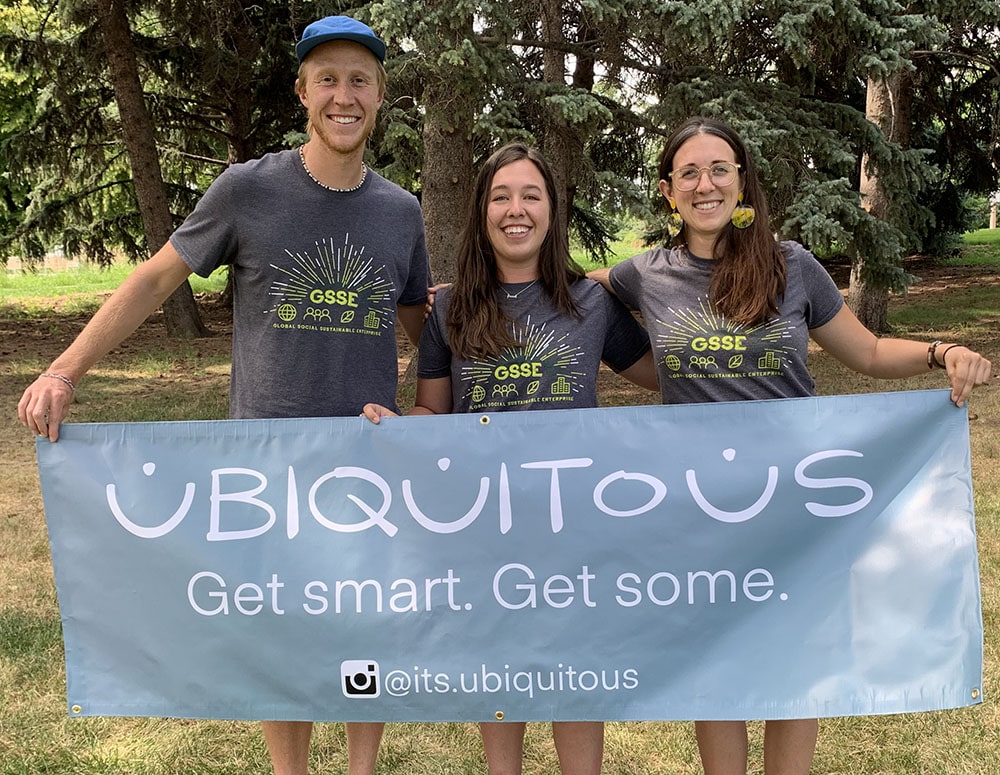Ubiquitous Brings Education, Products to Neighborhoods to Inform Teens of their Bodies

“Sexuality and bodies and periods? They’re ubiquitous. Also the problems that tie into them are ubiquitous,” Francie Saunders explains her venture’s hope to address period poverty. “We want the solutions to be there for everyone, too.”
Saunders’s startup, Ubiquitous, faces a difficult challenge. According to a 2019 estimate by Obstetrics and Gynecology, 64 percent of the United States’ impoverished women didn’t have the means to purchase feminine hygiene products at some point in the past year. Researchers use the term period poverty when discussing the lack of access to products and information about menstruation. It negatively impacts more than 27 million women each year.
While period poverty challenges women and girls across the world, Ubiquitous plans to chip away at the problem on a much smaller scale. Focusing its attention on providing resources to girls who face economic, social and educational obstacles to period health, the startup plans to provide products, consultations and general education about sexuality through a mobile-services model delivered through a vehicle converted to its needs.
Saunders joined teammates Reid Anderson and Emma McKay as they researched and developed their business model as part of the summer practicum portion of the Global Social and Sustainable Enterprise MBA. The practicum gives students the opportunity to develop a startup that addresses a social or environmental problem, creating products or services and the organizational structure to support them. Many ventures conceived in the GSSE MBA practicum have become full-time startups for the entrepreneurs in the program. Starting in Fall 2020, the GSSE MBA has been incorporated into the social entrepreneurship track of the College of Business’s Impact MBA.
Ubiquitous hasn’t made the leap past framing yet, but its members are focusing on a startup in Memphis. The students chose the area because socioeconomic and institutional factors make period poverty particularly acute for youngsters. With tight limits on teachers’ ability to address sexuality in the classroom and families uncomfortable discussing the topic, many teens don’t have basic knowledge about menstruation and sexuality. Forty-eight percent of Memphis’s population live in high-poverty neighborhoods, according to the Economic Innovation Group, so many women and girls face economic hurdles securing products even when they’re well informed.
The team quickly realized that the combination of those factors made merely educating women and girls about menstruation likely to be ineffective. The trio decided to couple educational resources with pay-what-you can pricing for feminine hygiene products.
“The Internet is out there, but you still need the products,” Saunders explained. “We need to bring it to people. We can’t just expect them to go online, search the right things and figure out for themselves, especially if you’re living in a home that’s not OK with that kind of exploration.”
Ubiquitous may be building a business plan that helps build a better world, but its founders are looking for more than social impact. They hope to use their business acumen to develop a profit-driven business. For a business developing pay-as-you go pricing, that could be a challenge.
“We’re definitely exploring opportunities for grant funding because there are a lot of grants especially available in the U.S. for things like this,” Reid said. “Most mobile health units, I think it’s over 90 percent, operate as nonprofits.”
The path forward may be a challenge, but Ubiquitous is developing its business plan in an MBA program that’s perfectly geared to the challenge. Embracing the College of Business’s business for a better world vision, the GSSE and Impact MBA programs provide entrepreneurial students an environment specifically designed with a focus on having a positive social impact. Surrounded by classmates and faculty who share a passion for progress, Reid, McKay and Saunders found a home in a program that gives them not just the latitude to pursue its plan, but the support and insight to make it happen.
“It’s working with people directly. It’s using business and it’s trying to achieve something great for the planet, too,” Anderson said. “There’s really just not that many programs that, are doing that right now.”

Ubiquitous is just one of the ventures in the Global Social and Sustainable Enterprise MBA that is finding new ways to use business to build a better world.
Learn more about sustainable yak wool, Islamic finance and more.